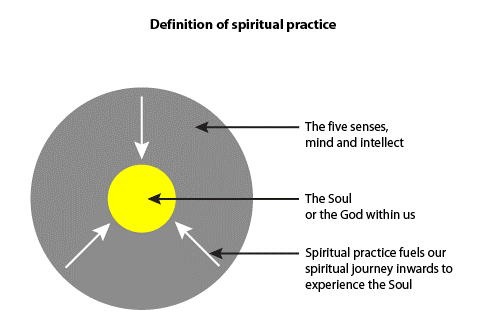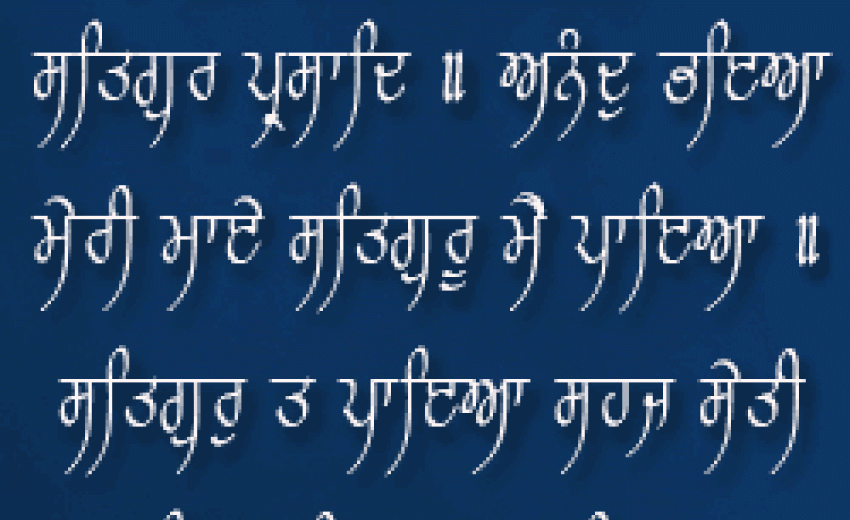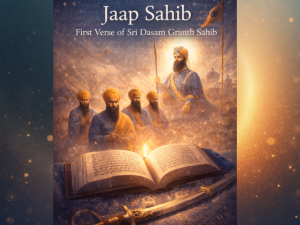Read Part I here
Read Part II here
Importance of Anand in Sikh Religion
People are filled with bliss upon meeting their beloved, so is our mind imbued with the Lord's Love11. Eternal bliss comes when one sings the Glorious Praises of the Lord.12 One must sing His Glorious Praises, and be in ecstasy forever.13 Then only the soul remains forever in bliss, day and night and remains immersed in His Love, night and day14. Eternal celestial bliss comes through the Guru's Teachings, by meditating continually on the Lord.15 A Gurmukhs (Guruward) remains blissful forever, day and night. Meeting the Beloved, he finds the peace.16
In Sri Guru Granth Sahib (M.3, pp. 917-922) an entire Bani, Anand Sahib is attributed to attaining bliss. Attaining bliss is so important in Sikhism that Anand Sahib is chanted at all the religious ceremonies of the Sikhs irrespective of the nature of event, be it a marriage or death.17 Having tasted the Nectar of Divine Bliss upon meeting the Beloved God, Guru Amar Das writes of the Supreme Bliss he experienced, enjoyed, and attained in begetting, finding, and meeting the Holy True Guru18. There are two versions of Anand Sahib one which extends 40 stanzas and one shorter version19 which extends the first 5 stanzas and then skips to the very last stanza. This shorter version of Anand Sahib is usually recited at the act of closing ceremonies20 before Sikh prayer (ardas) and is included at the end of Rehras. Here too the word Anand means complete happiness (bliss) and it is said that the person who recites this Bani in the morning with dedication, attention, and comprehension will achieve bliss and peace of mind,21 throughout the day22. To a devoted Sikh of the Guru, all Dukh (Pain) and all Sukh, (Pleasure) are expected to appear the same23.The Sikh enjoys the comforts of the world but does not get lost in the pleasures.24Anand pertains to the Bliss of the Atman; it does not diminish in adversity.
The purpose of the Anand Sahib is to help a person develop the capacity to live every breath in tune with the soul's reality. Suffering comes when we spend our life chasing after the fantasies of the mind instead of serving the God within. The Anand Sahib teaches us to live in the world without losing touch with our Divine Identity.
It is perpetual in all ups and downs of life. This Anand transcends pleasure and pain, joy and sorrow (Stanza 4). Another important point in the Anand Sahib is that without the Guru's grace Anand cannot be attained, "All [people] talk of 'Anand', but from the Guru's teaching alone is its essence realized. (Stanza 7). In Anand Sahib Guru Amar Das puts forth the criteria of an ideal disciple who deserves Guru's Grace.
- The Sikh has to willfully accept the Divine law (hukam) and the devotee is required to surrender his complete self to Guru's guidance. The self includes body, mind and wealth (tan, man and dhan) (Stanza 9).
- The Sikh is advised to abandon cleverness (chaturai). Guru Amar Das states that stability of mind is not attained with worldly wisdom or intellectual understandings. (Stanza10)
- The Sikh should not be engrossed in the worldly things which make them forget the real essence of the Supreme Reality. Guru Amar Das states that human beings get entangled with their families and relatives (kutumb), who are perishable. They would not be helpful to them for the attainment of Spiritual Bliss. (Stanza 11)
- The seeker of Anand is prohibited to adopt the way of ritualism. Guru Amar Das categorically says that stability of mind (Sahaj) cannot be realized with the formal rituals. (Stanza 18)
- It is suggested that the devotee should banish the love of the second or the other (duja-bhau). Guru Amar Das writes, 'those who with the Guru's Grace get engaged in Him, the Supreme Reality, they achieve realization even while living in maya.' (Stanza 29)
- To make one's mind stable, the devotee should always praise the Divine attributes of the Supreme Reality. He is advised to constantly meditate on the Name (Naam) of God. As soon as the devotee's mind concentrates on one God, it sheds all the sufferings and pains of life. (Stanza 2) Finally the stage comes when one says: I am in constant bliss, lovingly attuned to the Lord's Name.25
Environment for Bliss
 |
| Some moments and places most suited for Bliss |
In the company of the Sat Sangat, (the congregation of holy men), one finds the God with intuitive ease and ecstasy by great good fortune26. Joining with the humble Saints of the Lord, one's actions bring prosperity, and one obtains the Lord of Bliss like a wife gets the one sfter meeting her husband27 . For this one has to sacrifice all pleasures of power and pelf; the happiness from worldly wealth; the pleasures of the company of women or intoxication because anything unnatural leads one away from bliss. The pure energy is utilised in wishing for happiness, is itself Blissful in nature. Once this is realised, desires will not be generated at all. The Bliss that an ordinary man experiences in the company of a woman; is constantly experienced by the one who is liberated from the cycle of birth and death; hence he does not harbour any sexual desire. (Saint Eknath Maharaj) 'The less desires a person has the more enjoyable is his company. In spite of the desires being present in a subtle form in children they are very lovable. Then why should one consider it impossible for one whose desires have totally been destroyed by The Lord's grace to impart Bliss to others when in His company?' Saints emit frequencies of Bliss. Every seeker experiences them once he is able to perceive the subtle dimension beyond the five senses, mind and intellect.
Avoid the company of evildoers. In the company of an evildoer an individual begins to consider unhappiness, for instance stealing, drinking alcohol, etc. as happiness. In the company of a saint however happiness appears like unhappiness. Actually this is detachment (vairagya). Saints destroy the very desire for happiness. Similarly in the company of a saint, due to the acquisition of strength to endure unhappiness even that appears like happiness. Hence no unhappiness is felt, only Bliss is experienced in their company. Just as cancer cells are destroyed with certain radiations, so also dissolution of the mind and intellect occurs after exposure to frequencies of Bliss from a saint when in His company for a long time. In other words, the subtle and causal bodies and nescience are destroyed, and the individual experiences inner Bliss.
Striving for True Bliss:
Initiation to spiritual bliss may be through sudden exclamation on God's wonderful creation; it could be a slow awareness that the life you are living is not working anymore. It could also be triggered by a sudden life event (a death, divorce, job loss), or it could evolve through periods of inner reflection and study. But once you reach a stage of awareness, once you see that spiritual bliss is attainable (even if just briefly), you have set foot on the path and begun the journey.
The search for bliss is what drives human beings from cradle to grave. "Attaining bliss can take lifetimes, or one can simply choose to experience it in their deepest dreams. Sleep well my friend, as dreams are vehicles that can quickly take you to the awareness that you call Nirvana" Gary Hopkins. "When all mental distractions disappear and the mind becomes one-pointed, it enters the state called Samadhi. Patanjali (Founder of Yoga, circa 500 A.D)
Waves of Bliss arise in the river of Bliss,
Blissful is the nature of Bliss.' (Tukaram Maharaj)
In order to attain bliss in your life, you must wholeheartedly believe it is possible. One has to learn to configure one's life in such a way that one can be on the path to spiritual bliss. Spiritual bliss comes from being totally connected with oneself, one's soul, one's body, and a higher power (meaning everyone). It is a high experience of life, rich with the subtleties and details that open one up to a quality of life unmatched by the trappings of the material or linear world. One can encounter ever-expanding pools of bliss as one learns what constitutes a life of joy and contentment, free from worry and suffering.
Sometimes, it may happen when we see a magnificent sunrise or sunset. Or seeing our baby sleeping, in deep innocence, trust and relaxation could bring it on. Knowing we are truly loved by another human being, brings such a deep let go that we find ourselves enthroned in bliss.
The master key to accessing oceanic bliss is meditation (concentration in God). Methods of meditation are not going to give us bliss on a silver platter. But by practicing meditation, we cleanse those layers within us, which are preventing us from recognizing bliss as our ever-present reality. When we practice meditation which uses the physical body, it is easy to enter into bliss, simply because the body is always in the present moment.
There is a wonderful saying, 'follow your bliss.' Like a bee moving to the center of a flower, life is continuously offering us opportunities to find that point of resonance where body, mind and soul are all aligned. In truth, there is nothing more important than the searching and striving for bliss.
How to attain Bliss?
Bliss is already within oneself. One should not expect someone else to give it. The body becomes a teacher, helping our mind to drop into pure presence, opening us to wholeness. When body mind and soul are all in alignment, this is when bliss becomes a way of life. Living our truth with awareness will result in a bliss-filled life. In short, bliss is a reconnection with our true nature, that which was, is and will always be the eternal beyond time and mind. Life brings many changes and challenges, and sometimes there may be times of both ecstasy and agony. But having deeply embraced the quality of timeless bliss, which underlies all of life, these challenges can be experienced as waves, coming and going, within the ocean of bliss making it one's nature.
Self realization is essential. Only when the impressions of desires and instincts, likes and dislikes, temperamental characteristics, etc. are wiped off from the subconscious mind that is only when nescience is destroyed can one experience the Bliss lying dormant within oneself. This method of destroying impressions and nescience is called spiritual practice. 'If one realises the eternal value of life, then one will be able to obtain Bliss from temporary things'. However without understanding the permanent, no matter how hard one tries to obtain happiness or Serenity from the impermanent, it proves futile.' 'There is no permanent happiness in objects which are changing or have a limitation. That which is infinite and eternal is the true site of origin of happiness. It bestows everlasting Bliss and releases one from the bondage of unhappiness forever.' The Giver of peace is eternally blissful. We are absorbed in intuitive peace through the Guru's Teachings,28. Those who have earned the bliss, always remain happy29.
The ways of realising the absolute value of life are as follows. Repetition (chanting) of The Lord's Name, attending spiritual meetings or remaining in satsang (holy company) of seekers or saints, service of the Absolute Truth (satseva), sacrifice and spiritual love (priti) for all are the main aspects of spiritual practice. Spiritual practice wipes off the impressions in the subconscious mind. Apart from this, the accumulated account of destiny decreases and the ability to withstand suffering due to destiny increases. Besides, by doing spiritual practice the sattvik (sattva predominant) nature is enhanced. As a result decisions made are more appropriate and errors in willful actions are avoided.
Path of Righteousness (Dharam)
The tendency of all living beings is to attain happiness (in this context the word happiness is used synonymously with Bliss), but they cannot expect to get it without following the ethics of Righteousness. Hence they should be observed. The righteous individual whether knowledgeable or ignorant, will definitely experience happiness30.
'Righteousness (Dharma) proclaims that once one blends with the God (Brahm), one experiences eternal happiness. If this is true then from an individual's viewpoint attaining the Final Liberation (Moksh/Mukti) that is blending of the soul with the God itself is the supreme goal. One should certainly leave this body but should also destroy the awareness of 'I'ness. Righteousness states that even thereafter one will experience happiness. If the one experiencing the happiness himself does not exist then he will acquire happiness, such is this strange concept (reality).' When 'I'ness ends only the God exists and as Its nature is Absolute Truth (Sat), Absolute Consciousness (Chit) and Bliss (Anand), one gets the spiritual experience of Bliss. At that time there is non-duality between the one experiencing it and the experience itself.
To tread the path one has to realize oneself. One's origin, development, place and future in the universe has to be understood. One has to distinguish between self and ego. One has to get detached from the world gradually, first living life as simple as possible reducing attachments as possible and take the path of least resistance. Develop and enjoy relationship with people of your taste and also show love, kindness and compassion to all others; all beings irrespective of caste, creed, colour, life pattern etc. True to live life normally and with ease as it comes. Don't rush through life. Slow down. Savour and experience everything. Do not have knee jerk reactions. Respond to the people from your soul rather than mind or attached ego. Cut down your wants gradually; Cut down ego too. Be truthful; falsehood has more problems than solutions. Be healthy, have routine balanced food and do routine exercises; unhealthy body does not provide bliss. Be clear and clean in thought and action. Always be positive and cut down all negative thoughts and actions.
Ever Lasting Bliss
Path of obtaining ever lasting bliss has been described step by step in Sri Guru Granth Sahib (p.370). First, one has to renounce his egotistical love of self. Second, one has to renounce the ways of the world. He has to shed differences between beings. Renouncing all the three qualities and considering all equals, forgetting differences of friend or foe, the fourth state of bliss is revealed by the true Lord. In the cave of celestial bliss, one obtains the blissful seat. The Lord of Light plays the unstruck melody of bliss making one ecstatic, contemplating the Guru's Shabd. Imbued with Beloved Lord (the husband of the soul), one is blessed, making the soul (bride) happy. Guru Nanak says: the One who listens and practices it, is carried across and saved; is not reborn, or gets death again; he is beyond transmigration. He then remains blended with the Lord, the permanent state of bliss31.
In order to seek bliss or higher happiness, we must try to seek God, or try to know ourselves. By following any of the methods prescribed by the saints and scriptures of the world, if we silently practise, we can attain that bliss. According to Hinduism, no one is condemned. No one is bad. No one is a sinner. All sins are mistakes. All are heirs to immortal bliss. All can attain it. This is because, all are bliss. Misery, sorrow, etc, are only outer coverings.
The Lord's praise and adoration provides intuitive peace, poise and bliss32. Permanent bliss occurs when one is attuned to the Lord's name33. Eternal bliss comes when one sings the Glorious Praises of the Lord34. Those who have the Support of the True Name are in ecstasy and peace forever35. The real enjoyment is being in a blissful state forever. One is totally blissful when one is carefree and at ease36. This is the actual aim one aims at but falls short of it because of ignorance and lack of direction. How can one be in a blissful state forever? In Sri Guru Granth Sahib its beautiful description is found in the stanzas on 'Anand' meaning bliss as described earlier. Happiness, anand or bliss arises from peace equanimity, stability, detachment, renunciation, absence of desires, contentment, devotion, love and liberation. Bliss is better known through the Guru37. Contemplating Guru's Word one gets ecstatic38. One who dies in the Guru's Word finds eternal bliss39. Quieting the ego, ecstasy is obtained. Where the ego does not exist, God Himself is there40. Eternal bliss is obtained at the imperishable true place (of God)41. One get the bliss inthe Company of the Holy too42. They remain in ecstasy forever, day and night singing the Glorious Praises of the Lord, night and day43.
One may feel: "I have understood that what I am enjoying now is not real happiness. I have also understood that I must seek higher happiness. But, what is the proof that there is higher happiness? Can I get a taste of it here?' Of course you can! There is a simple technique for getting this happiness. It is this: Give up desires, and you will be happy. This moment, you decide. I shall give up all desires. I shall not want anything. All tension will go, all problems will go, and you will be in peace. Desires make us go round and round, achieving nothing. Let us give up desires, and we shall be instantly in peace. Simple rules of life may include:
1. Don't seek anything. If you seek anything, you will be in misery.
2. What we deserve, we get, always. What we don't deserve, we don't. So there is no point in worrying unnecessarily, because it will bring misery and not joy.
Let us leave everything to God. That is the best way to achieve happiness. Let us remember these simple principles. "I am miserable because this man did not love me. I am suffering because I did not get this. I am in pain because this man did not thank me." All this is wrong. Give up such ideas, and you will be in peace. Then you can use your energies for higher seeking.
Anand is a state of freedom. From freedom comes supreme bliss. Hence the best means to experience anand or happiness is liberation, mukti; liberation from worldly network; liberation from attachment to wealth, women and wine; liberation from kam, anger, greed, passion, pride; liberation from coming and going into this world.
Some practical steps of attaining bliss and peace of mind include:
- Don't have a hundred desires in mind. Decide now: From this moment, I shall not have desire for anything. Whatever comes in yourway, let it come. This will instantly bring peace. This is the initial stage of bliss.
- Don't worry that you are a sinner. This is one of the worst obstacles to joy. Give up worry. What is past is past. God is not a historian and a petty judge to judge you for what you did. Sins are mistakes done. Will the dancer go on weeping because she fell ten times when she was practising dancing? She will go on dancing. And will succeed. So in life, we fall a hundred times. Let us not worry about it.
- Don't worry if someone hates or someone dislikes you. Let them hate you. Let them not like you. The world is broad. There are millions of people here. Let everyone go their own way. Be free. Shake off everything, and you will be free and happy. Whenever anyone deserts you, or begins to dislike you, just say to your mind: 'O my mind! This world is impermanent. Let us seek something permanent: God.' Pray. Never imagine you are a big person. You are a little creature. You don't know what is in store the next moment. So hold on to God. This will bring peace.
- Control yourself. This itself is a big peace-giving method.
- Give your love only to God, and to none else. That will bring you immense bliss.
- If some problem comes in your life, don't start worrying. Worry will make things worse. Imagine that you are taking that problem in your hand like a fruit, and offer it to God. And pray. When worry comes, brush it aside and pray. This will help you immensely in every way.
Practice of Meditation for Spiritual Bliss
Bliss must be created, must be formed from a state of mindful peace. When you are fully present to the moment, focusing only on that which most requires your attention in the present-be it the rise and fall of your breath as you breathe, or the movements of your feet as you walk, or the words you are speaking as you talk, or the words someone else is speaking-then you attain peace. You must refine your mind in this way, practicing awareness of what is going on in the present moment with acceptance of it all as it is, non-judgmentally bringing your mind back to the anchor to which you have chosen to attend each time you notice your mind wandering.
When you eliminate mathematical thoughts and consuming feelings and nagging desires from your experience in this way, you gain control. You get back into the driver's seat of your life rather than continuing to live on autopilot, with your personality in the driver's seat. And when you are in the driver's seat of your life, your thoughts no longer think themselves for you, and your feelings no longer feel themselves for you, and your instincts no longer desire themselves for you, and your life no longer creates itself in reaction to itself through you. You recognize that you are the capacity to choose all of these things. You are the capacity to choose-free will, itself. You have no limitations upon you except those that you place upon yourself through the thoughts that you think and the feelings that you feel and the beliefs that you allow yourself to form through the repetition of thoughts and feelings.

You recognize that you can choose to transform the patterns and habitual routines of thought and feeling and behavior in which you have engaged. From this place of mindful peace, you can create new patterns-choose new thoughts, which will give rise to new feelings, which will give rise to new inclinations, which will give rise to new speech and actions, which will give rise to new physical manifestations in your life. From this place of mindful peace, each thought you think is like a single raindrop falling on the still surface of a pond. Its ripples spread outward without the interference of the ripples formed by other mathematical thoughts.
In this clarity and stillness of mind, you can choose to experience bliss. You can choose to learn from the past, rather than regretting it, willfully create the future toward which you are headed rather than experiencing anxiety and fear regarding it, and live in the present with acceptance and peace and joy rather than with anger and frustration. When you accept the way things are, you attain peace. And from there, you can create the way things become through the willful focus of your attention, making use of your mind as it has been carefully refined through the practice of mindfulness44.
When you watch the world that you have consciously and willfully chosen with your thoughts and accompanied with good feelings take form before your eyes in every moment, you experience bliss. For it is in this way that you come to fulfill your purpose in existing-to experience what it is like to be the Source and Creator of existence-and that you experience this fulfillment. It is in this way that you come to experience life in its truest form-the form in which it is being shared with you, and that you need only make yourself capable of receiving.-(Jonathan R. Wachtel)45.
The Blessed with bliss
In peace and pleasure, Gurmukhs (Guruwards) sing the Glorious Praises of the Lord of the Universe who is permeating everywhere46. They celebrate; their minds are imbued with the True Lord. They are forever in bliss, day and night; chanting the Glorious Praises of the Lord, they merge with Him through Guru's Teachings47. They hear and sing the Glorious Praises of the Lord. They, remain in bliss forever, day and night48. In every season they feel their soul in real bliss e.g., in the month of Chet, by meditating on the Lord of the Universe, a deep and profound joy arises49. In the month of Phalgun, bliss comes to those, unto whom the Lord, the Friend, has been revealed50 The Sound-current of the Naad vibrates there, amidst the sounds and the sights of bliss51. The Lord bestows bliss upon His devotees, and gives them a seat in the eternal home52. The Gurmukhs do good deeds and blossom forth; balanced and detached in the Lord, they are in ecstasy53. Meeting God, the true Guru, the mind is filled with bliss54. Chanting His Naam, (the Name of the Lord), the mind becomes blissful55. One is rejoiced in the eternal bliss received through the Word of God (Naam)56.
Concluded
===============
References
[1] The American Heritage® Dictionary of the English Language, Fourth Edition copyright ©2000 by Houghton Mifflin Company. Updated in 2009. Published by Houghton Mifflin Company.
[2] Collins English Dictionary – Complete and Unabridged © HarperCollins Publishers 1991, 1994, 1998, 2000, 2003
[3]http://www.gatewayforindia.com/articles/happiness.htm
[4] ਜਾ ਕੈਸਹਜਿ ਮਨਿ ਭਇਆ ਅਨੰਦu ॥ਮਃ 5, ਪੰਨਾ 237, ਸਤਰ 1
[5] ਜਪਿ ਜਪਿ ਨਾਮੁ ਮਨਿ ਭਇਆ ਅਨੰdw॥ ਮਃ 4, ਪੰਨਾ 367, ਸਤਰ 2
[6] ਹਉ ਛੁਟਕੈ ਹੋਇ ਅਨੰਦu ਤਿਹ ਹਉ ਨਾਹੀ ਤਹ ਆਪਿ ॥ ਮਃ 5, ਪੰਨਾ 260, ਸਤਰ 18
[7] यास्मिन् स्थितो न दु:खेन गुरुणापि अविचाल्यते ।
[8] सुखं आत्यंतिकं यत् तत् बुद्धिग्राह्यं अतींद्रियं
[9]http://ubudashram.org/bali-meditation-centre/ubud-inn/anandam-the-story-...
[10]http://media.radiosai.org/journals/Vol_04/01SEP06/veda_musings_understan...
[11] ਮਿਲਿ ਪ੍ਰੀਤਮਜਿਉ ਹੋਤ ਅਨੰਦwਤਿਉ ਹਰਿ ਰੰਗਿ ਮਨੁਰੰਗੀਨਾ ਜੀਉ ॥੩॥ ਮਃ 5, ਪੰਨਾ 100, ਸਤਰ 16
[12] ਸਦਾ ਅਨੰਦੁ ਜਾ ਹਰਿਗੁਣ ਗਾਮੁ ॥੨॥ ਮਃ 5, ਪੰਨਾ 186, ਸਤਰ 6
[13] ਮਨ ਰੇਸਦਾ ਅਨੰਦੁਗੁਣ ਗਾਇ ॥ ਮਃ 3, ਪੰਨਾ 36, ਸਤਰ 12.
[14]ਸਦਾ ਅਨੰਦਿਰਹੈ ਦਿਨ ਰਾਤੀਅਨਦਿਨੁ ਰਹੈ ਲਿਵਲਾਈ ॥ ਮਃ 3, ਪੰਨਾ 245, ਸਤਰ 15
[15]ਸਹਜੁ ਅਨੰਦu ਸਦਾ ਗੁਰਮਤੀਹਰਿ ਹਰਿ ਮਨਿਧਿਆਇਆ ॥ ਮਃ 3, ਪੰਨਾ 163, ਸਤਰ 14
[16] ਸਦਾ ਅਨੰiਦ ਰਹੈਦਿਨੁ ਰਾਤੀ ਮਿਲਿ ਪ੍ਰੀਤਮਸੁਖੁ ਪਾਏ ॥੩॥ ਮਃ 3, ਪੰਨਾ 31, ਸਤਰ 6
[17] Kaur, Gurwinder (May 2007). "The Theme and Significance of ‘Anand’ Bani".The Sikh Review.
[18] Cole, William (1990). A Popular Dictionary of Sikhism. The University of Michigan: Curzon. p. 18.
[19]Neki, J. "Anand Saheb".thesikhencyclopedia.com. Retrieved 15 March 2013.
Khokhar, Kulwant (2003). Nit-Nem Daily Prayer. Virginia, USA.: Dr. Baljit Singh Sidhu-Dr. Jatindar Kaur Sidhu. p. 11.
[20]http://www.thesikhencyclopedia.com/sri-guru-granth-sahib-and-guru-gobind... sahebhttp://www.globalsikhstudies.net/pdf/Nitnem%20by%20Dr.%20Kulwant%20Singh...
[21] Kaur, Gurwinder (May 2007), "The Theme and Significance of ‘Anand’ Bani". The Sikh Review.
[22] Macauliffe, Max (1909). The Sikh Religion, Vol. II. Clarendon Press Oxford. p. 130.
[23] "Anand Sahib".srigurugranthsahib.org. Retrieved 15 March 2013.
[24] Kaur, Gurwinder (May 2007). "The Theme and Significance of ‘Anand’ Bani". The Sikh Review.
[25] ਸਦਾ ਅਨੰਦu ਹਰਿ ਨਾਮਿਲਿਵ ਲਾਈ ॥੬॥ ਮਃ 3, ਪੰਨਾ 233, ਸਤਰ 8
[26] ਵਡੈ ਭਾਗਿਸਤਸੰਗਤਿ ਪਾਈ ਹਰਿ ਪਾਇਆਸਹਜਿ ਅਨੰਦੁ॥੨॥ ਮਃ 3, ਪੰਨਾ 29, ਸਤਰ 14
[27]ਹਰਿ ਸੰਤ ਜਨਾ ਮਿਲਿ ਕਾਰਜੁ ਸੋਹਿਆ ਵਰੁ ਪਾਇਆ ਪੁਰਖੁ ਅਨੰiਦ ॥ ਮਃ 4, ਪੰਨਾ 78, ਸਤਰ 17
[28] ਸਦਾ ਅਨੰiਦ ਰਹੈਸੁਖਦਾਤਾ ਗੁਰਮਤਿ ਸਹਜਿ ਸਮਾਵਣਿਆ॥੨॥ ਮਃ 3, ਪੰਨਾ 126, ਸਤਰ 6
[29] ਮਿਲਿਆ ਲਾਹਾਭਏ ਅਨੰਦ ॥ਮਃ 5, ਪੰਨਾ 372, ਸਤਰ 5
[30] सुखार्था: सर्वभूतानां मता: सर्वा: प्रवृत्तय: ।- Ashtanghruday by Vagbhat, Sutrasthan 2:19
सुखं न विना धर्मात् तस्मात् धर्मपरो भवेत् ।- वाग्भटकृत अष्टांगहृदय, सूत्रस्थान २:१९
[31]pRQmy iqAwgI haumY pRIiq ] duqIAw iqAwgI logw rIiq ] qRY gux iqAwig durjn mIq smwny ] qurIAw guxu imil swD pCwny ] 2 ] shj guPw mih Awsxu bwiDAw ] joiq srUp Anwhdu vwijAw ] mhw Anµdu gur sbdu vIcwir ] ipRA isau rwqI Dn sohwgix nwir ] 3 ] jn nwnku boly bRhm bIcwru ] jo suxy kmwvY su auqrY pwir ] jnim n mrY n AwvY n jwie ] hir syqI Ehu rhY smwie ] 4 ] 2 ] (pMnw 370)
[32] ਸਿਫਤਿ ਸਲਾਹਣੁ ਸਹਜ ਅਨੰਦ ॥ ਮਃ 1, ਪੰਨਾ 352, ਸਤਰ 3
[33] ਸਦਾ ਅਨੰਦu ਹਰਿ ਨਾਮਿ ਲਿਵ ਲਾਈ ॥੬॥ਮਃ 3, ਪੰਨਾ 233, ਸਤਰ 8
[34] ਸਦਾ ਅਨੰਦੁ ਜਾ ਹਰਿਗੁਣ ਗਾਮੁ ॥੨॥ ਮਃ 5, ਪੰਨਾ 186, ਸਤਰ 6
[35]ਤਿਨਾ ਅਨੰਦuਸਦਾ ਸੁਖੁ ਹੈਜਿਨਾ ਸਚੁ ਨਾਮੁਆਧਾਰੁ ॥ ਮਃ 3]
[36]ਮਹਾ ਅਨੰਦ ਅਚਿੰਤ ਸਹਜਾਇਆ॥ ਮਃ 5, ਪੰਨਾ 371, ਸਤਰ 14
[37] ਕਹੈ ਨਾਨਕੁਏਹੁ ਅਨੰਦuਹੈ ਆਨੰਦੁ ਗੁਰ ਤੇਜਾਣਿਆ ॥੭॥ ਮਃ 3, ਪੰਨਾ 917, ਸਤਰ 18
[38] ਮਹਾ ਅਨੰਦu ਗੁਰ ਸਬਦੁ ਵੀਚਾਰਿ ॥ ਮਃ 5, ਪੰਨਾ 370, ਸਤਰ 16
[39] ਸਬਦਿ ਮਰੈ ਤਿਸੁ ਸਦਾ ਅਨੰਦ ॥ ਮਃ 3, ਪੰਨਾ 364, ਸਤਰ 6
[40] ਹਉ ਛੁਟਕੈਹੋਇ ਅਨੰਦuਤਿਹ ਹਉ ਨਾਹੀ ਤਹਆਪਿ ॥ ਮਃ 5, ਪੰਨਾ 260, ਸਤਰ 18
[41] ਸਦਾ ਅਨੰਦu ਨਿਹਚਲੁ ਸਚੁ ਥਾਨਾ ॥ ਮਃ 5, ਪੰਨਾ 237, ਸਤਰ 14
[42] ਸਾਧਸੰਗਿ ਮਿਲਿ ਕਰਹੁ ਅਨੰਦ ॥ ਮਃ 5, ਪੰਨਾ 293, ਸਤਰ 1
[43] ਸਦਾ ਅਨੰiਦ ਰਹੈ ਦਿਨੁ ਰਾਤੀ ਜਨ ਨਾਨਕ ਅਨਦਿਨੁ ਹਰਿ ਗੁਣ ਗਾਵੈ ॥੧॥ਮਃ 4, ਪੰਨਾ 305, ਸਤਰ 16
[44]http://www.livingwithselfawareness.com
[45]http://www.jonathanrwachtel.co
[46]ਸਹਜ ਅਨੰਦ ਗਾਵਹਿ ਗੁਣਗੋਵਿੰਦ ਪ੍ਰਭ ਨਾਨਕਸਰਬ ਸਮਾਹਿਆ ਜੀਉ॥੪॥੩੬॥੪੩॥ਪੰਨਾ 107, ਸਤਰ 5
[47] ਸਦਾ ਅਨੰiਦ ਰਹਹਿਭਗਤਿ ਕਰਹਿ ਦਿਨੁ ਰਾਤੀਸੁਣਿ ਗੋਬਿਦ ਗੁਣ ਗਾਵਣਿਆ॥੨॥ ਮਃ 3, ਪੰਨਾ 121, ਸਤਰ 17
[48] ਸਦਾ ਅਨੰiਦ ਰਹੈਦਿਨੁ ਰਾਤੀ ਗੁਰਮੁਖਿ ਸਬਦੁਕਰਾਵਣਿਆ ॥੫॥ ਮਃ 3, ਪੰਨਾ 125, ਸਤਰ 5
[49] ਚੇਤਿ ਗੋਵਿੰਦੁਅਰਾਧੀਐ ਹੋਵੈ ਅਨੰਦuਘਣਾ ॥ ਮਃ 5, ਪੰਨਾ 133, ਸਤਰ 11
[50] ਫਲਗੁਣਿ ਅਨੰਦ ਉਪਾਰਜਨਾ ਹਰਿਸਜਣ ਪ੍ਰਗਟੇ ਆਇ ॥ ਮਃ 5 ਪੰਨਾ 136, ਸਤਰ 4
[51] ਤਿਥੈ ਨਾਦਬਿਨੋਦ ਕੋਡ ਅਨੰਦu॥ ਮਃ 1, ਪੰਨਾ 7, ਸਤਰ 19
[52] ਹਰਿ ਭਗਤਾਨੋ ਦੇਇ ਅਨੰਦੁ ਥਿਰੁ ਘiਰ ਬਹਾਲਿਅਨੁ ॥ ਮਃ 4, ਪੰਨਾ 91, ਸਤਰ 1
[53]ਗੁਰਮੁਖਿ ਕਰਮ ਕਮਾਵੈਬਿਗਸੈ ਹਰਿ ਬੈਰਾਗੁਅਨੰਦu॥ ਮਃ 3, ਪੰਨਾ 29, ਸਤਰ 13
[54] ਜਿਸੁ ਮਿਲਿਐਮਨਿ ਹੋਇ ਅਨੰਦੁ ਸੋ ਸਤਿਗੁਰੁਕਹੀਐ ॥ ਮਃ 4, ਪੰਨਾ 168, ਸਤਰ 11
[55] ਨਾਮੁਜਪਤ ਮਨਿ ਭਏਅਨੰਦ ॥ ਮਃ 5, ਪੰਨਾ 201, ਸਤਰ 17
[56] ਕਰਹਿ ਅਨੰਦu ਸਚਾ ਮਨਿਸੋਇ ॥ ਮਃ 1, ਪੰਨਾ 8, ਸਤਰ 5 ਸਬਦਿਅਨੰਦਕਰੇਸਦਕੇਲਾ॥ ਮਃ 5, ਪੰਨਾ 97, ਸਤਰ 10





